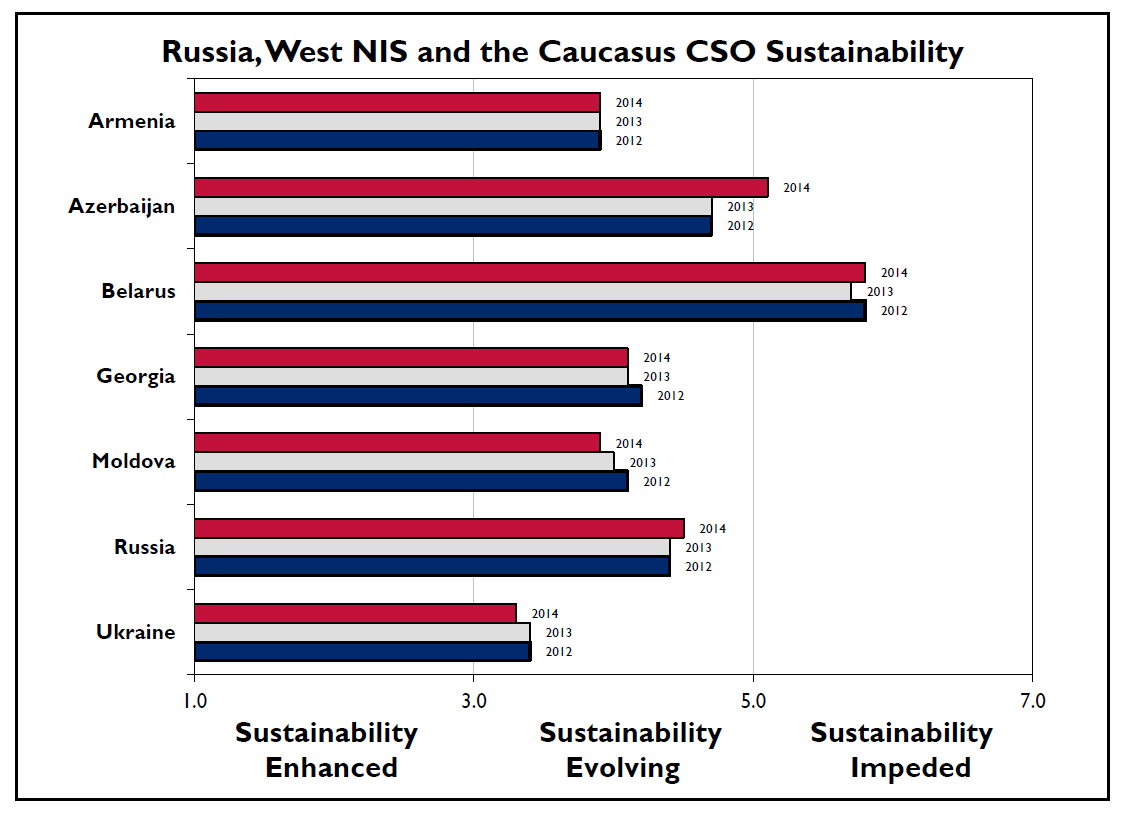|
IN THE SPOTLIGHT |
Eastern Partnership Civil Society Forum
|
|
CSO Sustainability in EaP Countries: Impeded or Evolving?The United States Agency for International Development (USAID) issued its 18th edition of the CSO Sustainability Index for Central and Eastern Europe and Eurasia, covering developments in 2014. The Sustainability Index reports on the strength and overall viability of CSO sectors in each of the 29 countries from the Baltics to Central Asia. The Index highlights both positive and negative developments in the civil society sector, and allows for comparisons across countries and sub-regions over time. The Index analyses and assigns scores to 7 interrelated dimensions: legal environment, organizational capacity, financial viability, advocacy, service provision, infrastructure, and public image. A panel of CSO practitioners and experts in each country assessed the sector’s performance in each of the seven dimensions. Later the Editorial Committee of technical and regional experts reviewed the panel’s findings and the scores were averaged to produce an overall sustainability score. The scores vary from 1 to 7, with a score of 1 indicating a very advanced civil society sector with a high level of sustainability, and a score of 7 indicating a fragile, unsustainable sector with a low level of development. The scores are grouped in 3 clusters: Sustainability Enhanced, Impeded or Evolving.
For the purposes of the Index the Eastern Partnership countries are included in the region Eurasia that also comprises Russia. The divergence in CSO sustainability in this region was particularly apparent in comparison to the other ones. Decrease in overall CSO sustainability was observed in Azerbaijan (5.1), while Moldova (3.9) and Ukraine (3.3) reported advances. Azerbaijan and Belarus are included in the Sustainability Impeded category in 2014. In Belarus (5.7), the government remains indifferent towards service-providing CSOs and negative towards human rights and democracy organizations. Belarusian CSOs can only use foreign funds following approval from a group of state ministries and agencies, which is based in practice on whether the CSO and the donor are reliable and loyal to the government. The legal environment in Azerbaijan deteriorated, dropping from the bottom of the Sustainability Evolving category to the middle of the Sustainability Impeded category. Since the end of 2013, several amendments were made to the laws governing CSOs that significantly limit the operational environment for civil society. In addition, in 2014 the government launched an unprecedented wave of investigations of offices of domestic and foreign CSOs, followed by interference in their activities, freezing of their bank accounts, and unjustified refusals to register grant contracts. As a result of these changes, Azerbaijan now has the lowest score it has recorded in this dimension since 2000. The remaining countries in Eurasia all remain in the Sustainability Evolving category. Ukraine continues to have the highest level of sustainability in the sub-region, nearing the Sustainability Enhanced category, while Belarus has the lowest, falling in the middle of Sustainability Impeded. In Moldova, changes to the civil code simplified the dissolution process for CSOs and other legal entities, while amendments to the Fiscal Code were approved that establish a legal framework for individuals and legal entities to donate 2 percent of their income taxes to CSOs with public benefit status. In addition, the Ministry of Justice began planning One Stop Shops to facilitate registration. Armenia (3.9) and Georgia (4.1) preserved their score from 2013. However in Armenia, anti-CSO discourse in the media was not prominent in 2014, a marked change from previous years. At the same time, the financial viability (score 5.2 and 5.0 respectively) of CSOs did not change in 2014 being the main problem for CSOs in both countries since they have to rely on foreign donors as their primary source of funding. EaP CSF WG1 co-coordinator Volodymyr Kupriy and WG1 member Shahla Ismayil were among the local CSO experts who worked on their respective countries’ profiles. |
Project funded by the European Union
![]()








